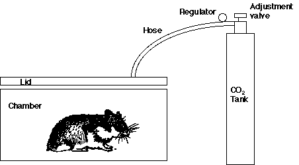其他模型
DNA preparation from mouse tails General precautions to be followed during handling of any genomic DNA sample: Avoid Shearing of the DNA by limiting mixing to inversion and gentle shaking. Vortexing o ...
Blastocyst embryo transfer into pseudopregnant recipient female mouseBlastocyst transfer is best performed after allowing injected embryos a little recovery time in culture. This allows better evaluat ...
ES / MEF cell culture and electroporation of targeting constructDay 0 One frozen vial of Murine Embryonic Fibroblasts (MEFs) is thawed quickly in a 37oC water bath. When the last bit of ice is melted ...
Always fill-in a form for each mouse you find/submit and make as many notes as possible about his behaviour health status or gross features. Always weigh the mouse. if mouse is found dead : Almost inv ...
You need to buy glass slides with frosted sandblasted ends (Fisher Scientific Catalog N. 12-552). Frosting by painting (e.g.Superfrost) should not be used. Pre-clean the slides by rubbing the edges ...
Histologic analysis of murine BM is a necessary complement to flow cytometric or in vitro analysis. Techniques to do this are well established in human hematopathology. A long tradition in experimen ...
Forms for submitting specimens to Pathology. Columbia University ICG onlyIn order to have full communication between the originator of the mouse and the pathologist you must fill a form with all the ...
Naming mouse strainsThere are internationally accepted rules to name transgenic and knock-out mice. See the following links: Mouse Nomenclature Rules and Guidelines These are suggestions about how to ...
How to keep track of your mice.Breeding mice can be very challenging particularly when you have to breed complex genotypes.You need a way to identify the mice permanently and a way to record birth gen ...
1. Grind 20-50 frozen flies with a mortar and pestle in N2(l) and suspend in 2 ml Lysis Buffer. 2.Add Proteinase K to 100 mg/ml; incubate 1-2h @ 37oC with occassional swirling. 3. Phenol extract GENTL ...
Animals are normally euthanized at the end of a study for the purpose of sample collection or post-mortem examination. Animals may be euthanized because they are experiencing pain or distress. Euth ...
RationaleThe use of mouse genetic models requires an efficient system of unique animal identifiers. The means that tissue must be obtained from each animal for genotyping and that each animal must be ...
Micro-CT检测肿瘤小鼠模型实验报告.pdf
Materials: fixative dependent on antigen (common: 4% formaldehyde or 100% MeOH) post-fixative dependent on antigen (usually MeOH) PBS 1X PBS PBST PBS + detergent (0.05 to 0.5 % Tween or Triton) DAPI ( ...
I. MEDIUMA. S2 S2C Sundefined S2R+ S3 Kc(167) DL1 & DL2 cells: Schneider''s/ 10% FBS/ PS450 ml Schneider''s medium (Gibco #11720-034)(pour off 50 ml into Falcon to save as serum-free~undefined*50_ml_Fetal_Bovine_Se_...
.1 RNA Probe Preparation (see Note 1) 1. 1.5 mL microcentrifuge tubes or standard 96-well V-bottom microplates.2. RNAse free water.3. T7 T3 or SP6 RNA Polymerase (Fermentas Life Sciences Burling ...
Purpose: To isolate intact high molecular weight DNA from yeast cells for subcloning and rare cutting restriction enzyme analysis. One can expect a yield of 100-200 � of DNA per prep. Time required: 6 ...
Purpose: To perform restriction digests of YACs for mapping using rare cutting enzymes or more conventional restriction endonuclease digestion. Time required: 2-4 hours Special Reagents: dependent upo ...
Grow 10ml YPD cultures o/n. Figure out cell density; inoculate 30 ml YPD and grow o/n so that cell density is approximately 2 x 108 cells/ml the next morning.Spin down cells in 50 ml sterile conical t ...
YEPD (non-selection)-1% yeast extract-2% peptone-1.5% agar (if needed for plates)After autoclaving add glucose to 2% by adding 100 ml of 20% solution to each litre media.SYNTHETIC MEDIA (selective med ...







